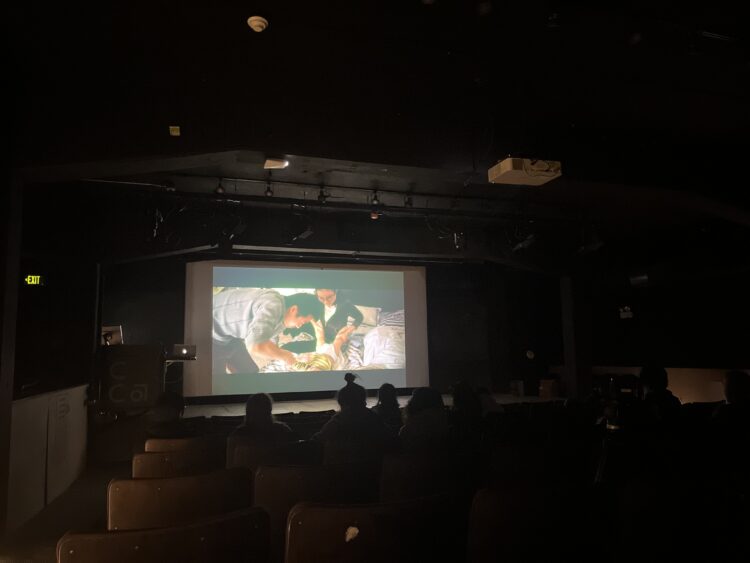WeOwnTV Captures the Ebola Crisis from the Perspective of Those Who Lived it in Sierra Leone
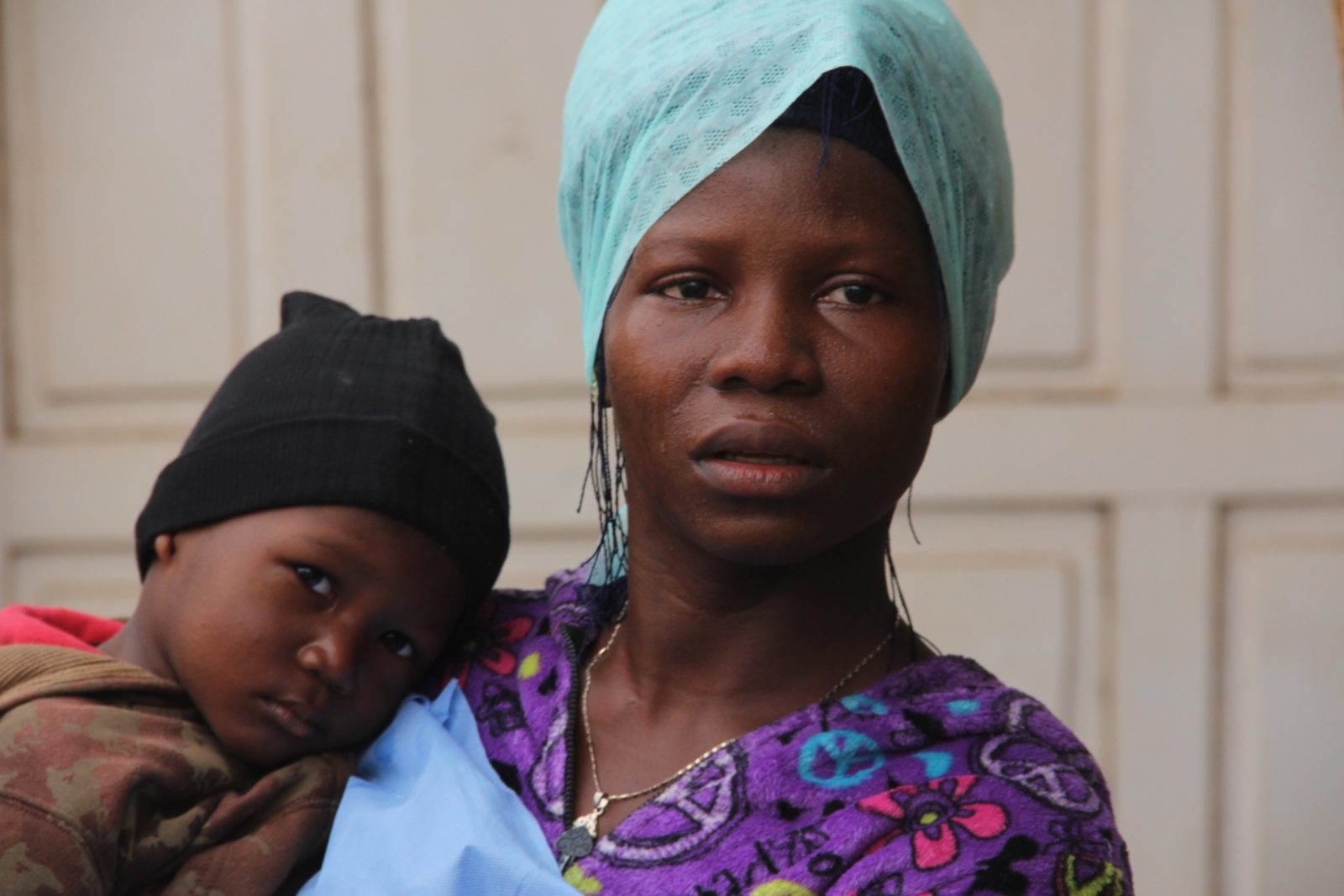
Who tells the story about a particular community is important, and sometimes it’s a matter of life and death. The team working at WeOwnTV, a media learning center in Freetown, Sierra Leone, learned this first hand when they found themselves in the middle of the Ebola crisis in 2014. That center is the Creative Capital project of Banker White, who turned a workshop with Sierra Leoneans into a brick-and-mortar space dedicated to media education and professional development. Arthur Pratt and Barmmy Boy, born and raised in Freetown, and managers at WeOwnTV were then equipped to tell the story of those on the front line in the country fighting Ebola. Their documentary, Survivors, premieres on PBS’s POV on September 24, 2018.
We spoke to Banker White about WeOwnTV and the lessons they learned ahead of the making of Survivors. We also spoke to Arthur Pratt, one of the principal directors of Survivors.
Alex Teplitzky: Can you describe Survivors and how it relates to your Creative Capital project?
Banker White: Survivors is a feature-length documentary about the Ebola outbreak that happened in 2014 and 2015 in West Africa. It was co-directed by two Sierra Leoneans and two North American filmmakers, Arthur Pratt and Barmmy Boy, and myself, and my wife and producing partner, Anna Fitch. The film is told from the perspective of a Sierra Leonean filmmaking collective and highlights the contribution of African nationals to the outbreak showing you intimately how everyday Sierra Leoneans were affected by the outbreak.
My Creative Capital funded project, WeOwnTV, was initially based around a workshop that we were planning to run with a team of West African media makers. That project snowballed into a really vibrant media collective. A year into Creative Capital’s support I ended up co-signing a lease for a brick-and-mortar media center. That was 2010, a year after we ran the workshop. I’ve had a relationship with that center through that time, and I incorporated a nonprofit that supports that center. I’ve continued to give classes and mentor West Africans on different projects.
When the outbreak started in Sierra Leone, that collective was in such an amazing position to be able to tell the story of the epidemic, so Anna and I decided to work with that team to turn it into a feature-length film. In terms of the mission of that project, it’s a pretty amazing single piece of media in a collection of all kinds of media that they’ve produced. But it’s also really emblematic of realizing the goals and the mission of WeOwnTV in the first place.
The team not only produced life-saving public health messaging during the outbreak, and contributed as cameramen and fixers to international media, productions, and news, but they wound up producing a pretty extraordinary film that’s had a really wide broadcast. This film is going to be the first feature-length documentary that’s ever aired nationally on PBS directed by a Sierra Leonean. So, to have that exposure, and participation to writing and contributing to the historical record of your country, and being credited for it—it’s an amazing accomplishment.
It’s an incredibly tragic event that happened in a string of tragic events for that country, but to have Sierra Leonean media makers really actively involved in commenting on and recording the history feels like a real accomplishment as it relates to the rest of the project.
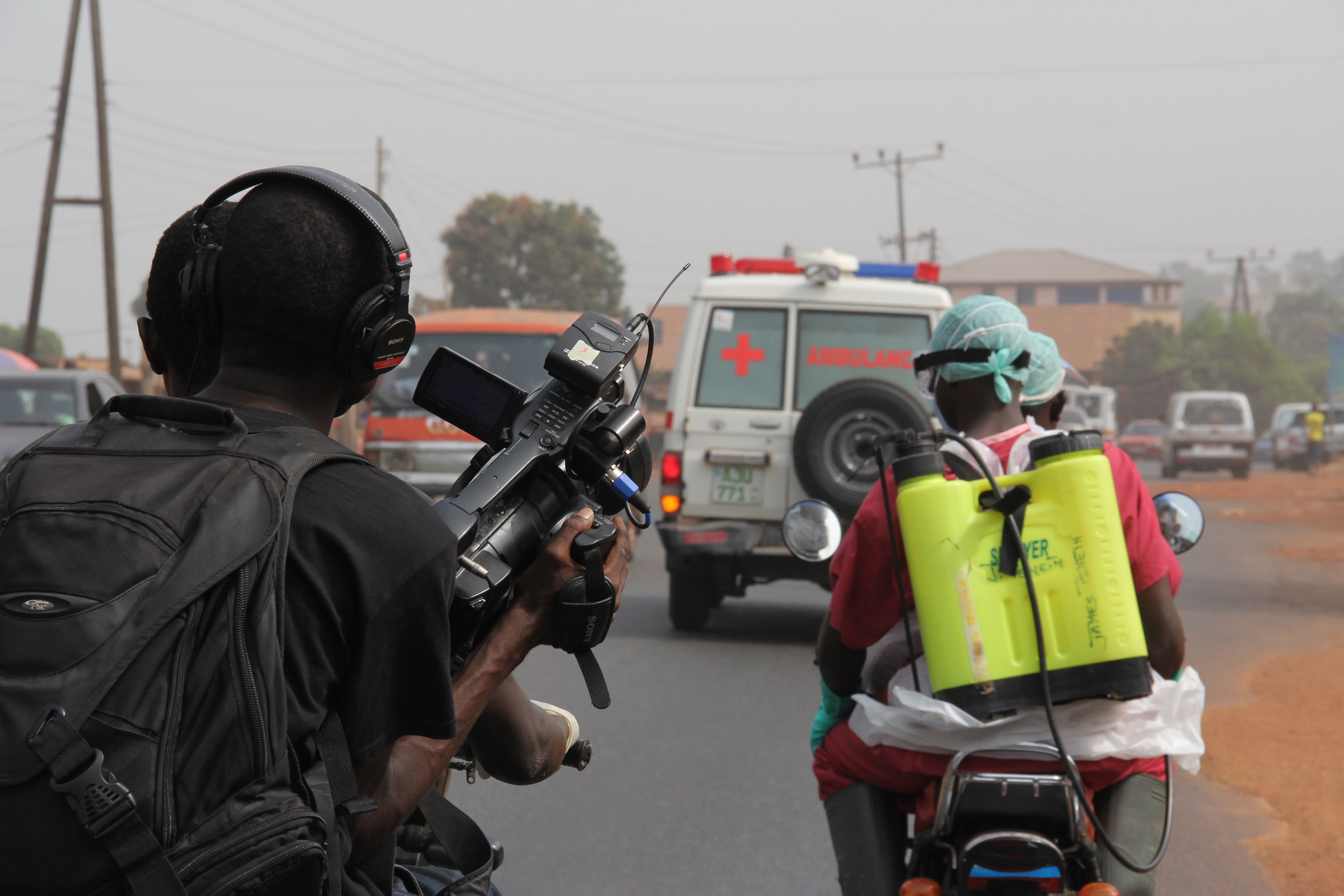
Film still from the documentary Survivors
Alex: I want to ask you more about that, but first, can you describe how you got involved with Sierra Leone, and a little bit of the history of WeOwnTV?
Banker: My first trip to Sierra Leone was in production for my first documentary, Sierra Leone’s Refugee All-Stars. That film tells the story of a band that formed in a refugee camp in Guinea—the neighboring country to Sierra Leone—during their 11-year civil war. The idea for the film was to find a group of musicians that could tell the story of that war. I developed the idea for the film with my friend and co-director Zach Niles. We’d both lived and worked in West Africa, and we were living here in the Bay Area.
We wound up meeting this band, and it was almost immediate—they were so much more interesting than our idea was. Somehow meeting them crystallized the idea for the film. They were a really interesting group: there was a husband and wife within the band, two amputees, an orphaned son, a 70-year old guy. They all had slightly different individualized experiences, but this kind of shared history having fled the country during the civil war, and they were writing really great music. We had a pretty collaborative relationship with them through the production of the film.
WeOwnTV made… short public services announcements and these longer, fictional, almost telenovela-style dramas that addressed misinformation, rumors, and in general were helping to establish trust-building between communities and health services—it was life-saving information.
I was really interested in, on the heels of that project, going back to Sierra Leone and meeting young media makers. WeOwnTV means in Krio, “our own television.” The UN peacekeeping mission in Sierra Leone was the largest in the history of the UN. That has a real cultural effect on people. There were kids displaced from a normal way to go to school that were bouncing in and out of different education programs. It’s a really complicated situation in a shifting economy as personnel come and go: it’s crisis-response, it’s not like nation building.
One of the things that we thought would be interesting was to work with young media makers who had been in and out of these types of “certificate of completion” style programs run by the humanitarian sector, and make sure that a workshop that was about storytelling, creativity, and the creative process build in the concept of ownership. We wanted to stress the concept that this thing you create isn’t for someone else to put their logo on. We wanted them to take pride in what it is that they have to share with the world.
That’s not a big stretch: the oratory skills and creativity that exists in West Africa is already awe-inspiring. But it was this question of focusing intention around workshopping those skills. I think for a lot of people who have missed out on schooling they were craving assistance to take the next step. One of the things we were stressing was that they had that, it was within them, they just had to trust themselves. Anyway, that was the basic idea of WeOwnTV. We wanted to make sure we met with local, professional media makers in Sierra Leone to co-teach this workshop.
On that trip we actually met Arthur Pratt and Barmmy Boy who ended up being the two managers of the Freetown Media Center, and ended up becoming the directors of Survivors.
Alex: Now, were they already media makers when you met them?
Banker: Arthur had already been through university studying theology and African studies, but he had a background in theater. He had written and directed some narrative films. The fun story is that when we went around Sierra Leone trying to find people to join us in leading the workshop, everyone was like, “You have to talk to Arthur Pratt.” The same was true with Barmmy Boy, who had done a lot of great freelance work, and was also a musician. So, they already had that reputation of being the guys in town.
Alex: Then, WeOwnTV goes from a workshop to become a brick-and-mortar space.
Banker: Our first workshop was 21 people, and we all lived together for six weeks. It was pretty intensive. We rented an old space in Freetown that hadn’t been used since the civil war. We convinced a family to rent us this big area they had with a conference space with a dormitory, and we hired a cook. It was a workshop, but it was a pretty intense experience for everyone involved, teachers and participants alike. Some really amazing work came out of that—it was even broadcast in film festivals in the US, and a whole program developed around it at a film festival in Madrid. Everyone that taught was like, “We don’t want this to end. What can we do to continue this thing that we just started?”
The idea to raise enough money to rent a space came out of that. The next workshops we taught were in this newly branded WeOwnTV Freetown Media Center. The team brought a lot of talented people, and they continued to do great work, including freelance work.
Alex: I usually ask at the end of the interviews how Creative Capital supported your project, but I feel like this is central to the story.
Banker: No, this is a really good thing. I recently talked about this at a screening of Survivors. One of the things that was interesting was talking to Ruby Lerner and Sean Elwood [former Executive Director and Director of Programs & Initiatives at Creative Capital, respectively]. There was this core element that was motivating me to do the work. I was so excited that I had just been given this money—partially being frugal, and project-oriented mentality—that it was difficult for me to see the potential of this in a career trajectory. In general, they told me, “This is great, we love what you’re doing, but the actual form of what you’re doing is somewhat nebulous. Sometimes with your other projects it’s been very clear. In this case, the outcomes could be potentially bigger than what you’re envisioning.”
Because it was all about collaboration, of course I was open minded around that. They continued to say, maybe it doesn’t make sense for you to run this workshop. Maybe you should go meet your collaborators and let that conversation inform your next step. They offered really interesting and wise advice about the creative process and collaboration. Creative Capital had the understanding as a group that primarily supports artists and career choices—they offered a different way to approach this opportunity.
I joked the other night that after this thing really blew up, and it had literally dozens of media assets, it was my turn to say “No, there’s something bigger. Just be patient!” Even here, on the flip side at the “end of the project” there was really interesting flexibility and continued support from Creative Capital. Even meeting you at the beginning of the making of Survivors, and you helped find some press interest about the public service announcement videos that the team was making, there was just this way that every new phase of the project had support in its own way. That’s pretty unique. There are certain aspects of what is templatized support that Creative Capital gives, but it also seems so individualized and flexible.
Alex: I was going to mention that first article that was written in the Daily Beast about the team at WeOwnTV making a series of videos broadcast in Sierra Leone to fight misinformation against how to fight Ebola.
Banker: Yeah, WeOwnTV made both a series of punchy, short public services announcements and these longer, fictional, almost telenovela-style dramas that addressed misinformation, rumors, and in general were helping to establish trust-building between communities and health services—it was life-saving information. It was a real balance by other strategies employed, like WHO and other NGOs whose strategies were backfiring. Some of them would, for example, target religious practices, like the laying of hands and burial practices. Those did contribute in a way, but the way and tone that the NGOs would bring it up was alienating to the community, as opposed to trying to court religious leaders and get them on board to figure out how to get people to change their behavior. It evolved and changed.
What we did at WeOwnTV actually informed how other groups started working. Groups that were working there formed the Social Mobilization Pillar after media like the BBC and Daily Beast started picking up on it. They started realizing they needed to have local media makers contribute to how we do our messaging. And they started meeting once every two weeks in November 2014. Beyond whatever impact the media WeOwnTV had, it also affected the way other organizations worked.
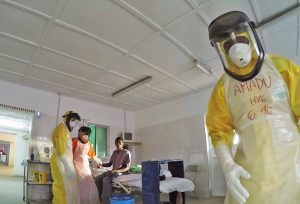
Film still from Survivors.
Alex: We talk a lot about how it’s important for films that deal with issues in certain communities to be made by the people in those communities. But that’s with independent films—here you’re dealing with public service announcement films. These are life or death issues, and you’re saying Sierra Leoneans must make the films that speak to other Sierra Leoneans.
Banker: What I learned along the way is that it’s not a new idea. For example, there are entire departments at WHO that talk about this. Whole departments at CDC are based on consultation with anthropologists before you go out and make public health messaging because you need experts that understand how to talk to humanity in a different way than scientists or medical personnel. In the CDC case they ended up cutting that department. So, everyone talks about this, but at the same time, if you don’t really emphasize it over and over again, when push comes to shove in a crisis situation, people just default to the way they typically do things. It’s not like these agencies or groups haven’t heard this before. It’s imperative that you don’t just say it, but you actually practice it. You have to exercise these methodologies over and over again for it to actually stick.
In a crisis response you drop into a different culture, the first thing to do is to create that Social Mobilization Pillar, not fail for five months, then realize later what to do.
Alex: So what’s the future for WeOwnTV?
Banker: We recently launched a filmmaker fellowship in the program. That was the beginning of us thinking beyond what we did in the region, and not do the same thing, but within our capacity, support other filmmakers in Sierra Leone. We opened it up actually to four countries: Sierra Leone, Liberia, Guinea, and Ghana. We just started our second round of fellows.
The programming is going so well. The films are amazing. The IDFA Film Festival in Amsterdam has invited our fellows as a West African delegation to the festival and to participate in their IDFAcademy. The fellowship is a really interesting way in which our working with WeOwnTV has evolved. Although we continue to give direct support to the center and the collective that works there, we’ve opened up this initiative to the subregion. Great filmmakers have come onboard to offer mentorship to the projects.
Read more about Survivors, WeOwnTV, and Banker White’s Mirabel Pictures.
In this interview with Arthur Pratt, one of the Sierra Leonean directors of Survivors, we discuss the making of the documentary, and his hopes for using it as a tool to manage future health crises.
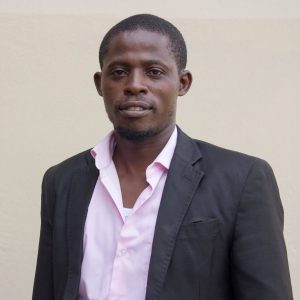
Arthur Pratt, manager of WeOwnTV, and director of Survivors.
Alex: Can you tell me how the Survivors project unfolded?
Arthur: The idea came about when we were filming for different corporations, like media houses, and other production companies that were coming to Sierra Leone. Basically, when the epidemic started they were not allowed to bring in their own cameramen, so they had to hire locals. NHK, Tyra Banks, and companies like that. In filming with those people, we had the opportunity to travel to the areas where there were actually infected people. By then the epidemic was not concentrated in Freetown, it was more in the provinces. While there, we saw the traffic, the amount of checkpoints, and the risk taken by individuals. Going to these villages you see quarantine houses, in all of these the people most at risk were still the locals. The stories that had been captured and going out to the rest of the world at that point had nothing to do with the locals. And by locals, I mean the police officers controlling check points, the drivers driving ambulances, the nurses working in hospitals, the local African doctors.
Those stories weren’t being told. Most of the stories were centered on Western doctors or aid workers coming into Sierra Leone. It wasn’t wrong, but I thought it would be nice to show stories of local peoples, people taking the risk to ensure lives are being saved. We saw the need to tell those stories, and we realized if we didn’t do it now, it was going to be another issue similar to the former colonial masters. They tell the stories how they want to tell stories and create their own heroes, and we, in Sierra Leone, end up without our own heroes. So, we decided we had to tell the story.
For me it was also personal. By then I was reflecting on those Shaka Zulu stories from South Africa in which you have the English version and the French version and they’re never the same. When I looked at my own history in Sierra Leone, I found the same issue. We have the civil war which has become the most notorious war in our history. You find stories in the war that are not in our history books in Sierra Leone. The other day I was talking to a friend who read a history book in Ghana and there for the first time I saw images of the Kareena massacre. So, all of this shows that our history has been taken away from us, we have been denied the truth. So that fire is what started this project.
So after coming from Kenema and having shot footage in Moyamba, listening to the news, I remember thinking that we have to start telling our own story, we have to stop working for outside corporations, and focus on shooting our own thing. We have to tell the story one way or another.
Alex: Survivors tells the stories of a few different Sierra Leoneans. Can you tell me about one of the stories?
Arthur: One of the interesting stories is about Mohammed, the ambulance driver. He was actually a driver for the Ministry of Health and Sanitation in Sierra Leone. But when the Ebola epidemic started, they were looking for drivers to drive ambulances, so Mohammed signed up, even though the information at the time was that Ebola kills. If you got infected, you’d die. He signed up noting that someone had to do it. Of the seven drivers that were hired, Mohammed is the only one alive right now, I think.
So, his story takes us through his personal life: we found out even though he took on the fight against the disease, his wife was supportive. He was also known in his community. People were looking up to him for leadership within his community. Even though he had no formal education, other drivers in the unit started looking to him as their leader.
So, he had to take on necessary risks and steps. For him, protecting the people he was working with became his priority. He had to take the risks to make sure people within his community and people in general had whatever help he could give. He put his life at risk because he had to pick up people without authority from the central command, knowing that if he didn’t pick them up in the ambulance, they would die. Sometimes he had to carry sick people on his back using personal protective equipment (PPE). It’s a policy that a driver should not use PPE—that’s the work of a nurse, but he had to do it because the nurse was indisposed. At the end of the day we saw that Mohammed came out as a hero contributing to the fight against Ebola.
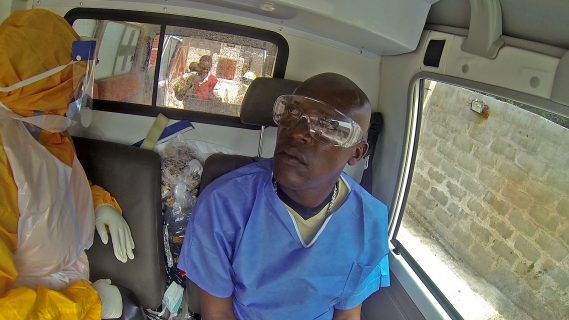
Mohammed, an ambulance driver featured in the documentary, Survivors
Alex: Wow. This may be a dumb question, but as a filmmaker, you must have been at risk too, or was it true for anyone in the country at the time?
Arthur: Yes. That risk was high, yes. It was serious for me. The fact that you’re shooting in poor communities in Sierra Leone meant drawing people to you. Even though the information going around was that people shouldn’t touch each other, there would be a lot of crowds when we went into a new community. It was quite impossible not to touch people. When we went into these affected communities, people approached you if you had a camera, wanting to see what you were doing. It wasn’t possible not to keep your distance. You want to keep trust from the community, you don’t want to spread fear. You also want to keep your access, and you know in documentary filmmaking, access is your primary tool. So, you have to take the risk.
There were many points when I thought I was sick. It happened when I came back from Kenema one day, having done some shooting on our way home in a Moyamba district. You understand the whole town was quarantined. We did some shooting there. I thought I had been infected. I thought I was sick, and I nearly gave myself up to the hospital. A friend advised I should take some rest for at least two to three days before doing that. If I felt I had a fever, then I should go to the hospital, but if I didn’t have a fever, then I shouldn’t take the risk to go to the hospital. After a day, I realized it was just fatigue and the mental strain. But the risk was there every blessed day.
Alex: Looking back on it, what’s your hope with the release of Survivors moving forward?
Arthur: The film itself for me is a well-balanced film that speaks not only of the heroism of the African workers, but also shows the dedication of international workers. It also shows some of the ills within our society, some of the wrong things we think in the health sector.
My hope is that the film inspires the right discussion among locals and international policy-makers. At the end of the day, when things like this happen, in whatever place in the world, we all will understand how we can collaborate together and apply ourselves to make sure we save lives. We have to understand our responsibilities, what are the risks, how we as human beings take the necessary risks to save our lives and the lives of young ones. We also have to make sure our attitude towards our work is correct.
For international communities, I hope that this helps them understand the culture of indigenous communities in countries. Sometimes when they enter countries, they tend to impose their own way of life—and that can hamper the progress of what you want to achieve. In this case, it hampered the ability to eradicate the disease. These are all the themes in the film that hopefully you can learn from.
I have been having discussions with people about issues that are raised in the film. My hope is that we continue the discussion, and that the film is used as a tool for social mobilization and education within African communities.
Find out more information about how you can watch Survivors on POV on your local PBS channel.
